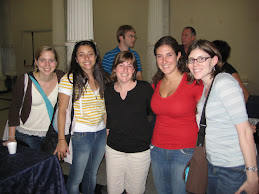Fulbrighters in Argentina

Monday, March 31, 2008
Where's the beef???
In other words, the supply of milk, chicken, and beef has been dwindling drasticly of late. And today, when I went to the grocery store, there was NOTHING. NO chicken, NO beef, NO milk. Not even milk products like yogurt. I have never seen so many completely empty shelves in my life. Let's just say, it's a good thing I like pasta!
But the whole experience of the strike has been interesting for me. First of all, I've never been in the middle of one before or had the effects of a protest or strike hit close to home (or maybe I should say "close to the fridge"). Second, over the past week, I've seen more and more businesses put up signs saying "Estamos con el campo" - basically "We're with the farmers." I've been attempting to read articles in La Nacion to understand exactly where the government and the farmers stand on the issues involved, but it's been difficult. Although my Spanish reading ability is relatively good (at least better than my speaking ability!), I'm facing a lot of agricultural and political terms that are completely new to me. Not to mention that I'm not very well versed in the basic politics of agriculture and taxes anyway.
I love that whether in the country or the city, all of the Argentines have an opinion about the issue. I would much rather see people debate their opinions than have no opinion at all. As long as they remain peaceful about it.
But for now, I'm just hording the carbs and praying that the heladerias don't run out of milk to make ice cream ;)
Wednesday, March 26, 2008
I don’t know if it’s me or if it’s just my luck with my travels, but I’ve never been to a place that I didn’t like.
Some things I love about traveling:
Sitting in a restaurant eating food unique to the country’s culture, yet listening to American music playing in the background – “Gangster’s Paradise” alongside “Girls Just Wanna Have Fun”
Not really knowing what I’m eating and enjoying it even more because of it
Having a good excuse to try all kids of foods (mostly unhealthy bus all delicious)
Willingness to accept things as true without really questioning why – for example, what is dulce de leche? I’ve accepted that it’s delicious and some kind of dessert without even knowing what it is.
Since language is something of a passion of mine, I can’t help but mention it here. I’m so grateful for the kindness shown to me while I continue to learn Spanish. No matter how much I stumble through my sentences, no one looks at me with disgust or impatience. I am constantly reminded of the contrast that I’ve witnessed so often in the US. I’ve seen so many Hispanic high school students isolated because of their language barrier. Rather than try to help them, many of their English-only speaking peers choose to simply ignore them.
Outside of school I’ve heard people complain about foreigners’ mispronunciations, strange accents, or lack of basic knowledge of the English language. I wish I could explain why it seems so hard for Americans to embrace diversity of language and culture. One thing I loved when I was teaching in NC was using Spanish examples to explain certain ideas to my students. For example, how some word parts in English have similar meanings to those in Spanish. I want so much for people to recognize the aspects of life and culture that bring people together around the world rather than separate them.
That’s why I’m so excited about teaching English as a second language. I don’t want my students to think I’m teaching English because I think it’s the best language, but rather because I want them to be able to learn something about another culture and make their own decisions about it.
I still have no idea what I’m going to do when I finish in Argentina, but luckily I have lots of time to figure that out ;)
PS - pictures coming soon!
Monday, March 17, 2008
Getting Started
Besides teaching, I’ll be volunteering. Right now I don’t know exactly which organization I’ll be working with, but Sandra has been very supportive and helpful in giving me ideas. I’m hoping to find a place where I can not only do hands-on service but also help in organizing service projects. After working with the Kernodle Center at Elon, I’ve learned a lot about organizing service opportunities. But I’m up for anything!
The language barrier is a little scary. I’m definitely one of the lower proficiency Spanish speakers among the other Fulbrighters in Argentina. Many of them have been working/living in Spanish speaking countries for some time. But I know that I’m here to learn and grow in many ways, and I’m not afraid to make mistakes (good thing since I make so many!). I have to keep reminding myself that understanding takes time…easier said than done ;)
Strangely, the most eye-opening moment for me occurred in the car on the way to the movie theater. One of the teachers that I’ll be working with offered to take me to the movies. We were discussing various things (thankfully in English) during the ride, and she mentioned the tragic events of 2001. Basically, the economy in Argentina was suffering greatly throughout the 1990s, and it completely collapsed in 2001. The whole country was bankrupt, and no other countries or world banks would loan it any money. I had read about this, but hearing my friend describe it first hand was unforgettable. This woman and her family are so much like mine: middle class, hard working, honest, committed. But when the government declared bankruptcy, all money was held in the banks. She and her family lost everything. As a teacher, she was only paid by the government every 3 months during that year, and even then it was half as much as she should have earned. A single mother raising 2 children and working every single day could barely put food on the table because of matters completely out of her control. I sat in the car and tried to imagine if it was me. I have worked hard for my money, and I keep it all in the bank. I would have lost everything. I don’t know how I would have lived. I cannot imagine the strength of mind and will it takes to overcome that kind of devastation. Yet she spoke of it like it was no great feat – just something she had to do.
Too often I have thought about those “less fortunate” than I am, but I could never really put myself in their shoes. Sitting in the car last night, I felt it. And I’m so thankful to my friend for helping me see exactly what it is I mean when I say that I want to HELP people – not just with money or time, but with sincerity and understanding.
So, with that in my heart and lots of random new Spanish phrases running through my brain, I’m ready to get in the classroom…

